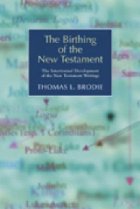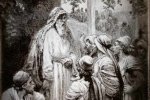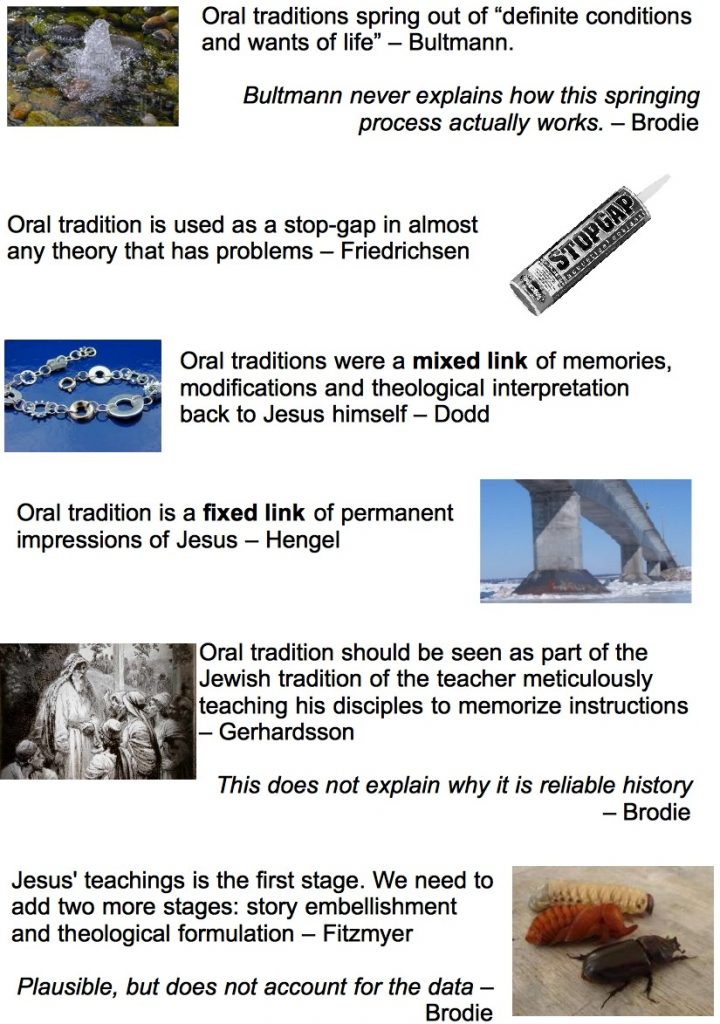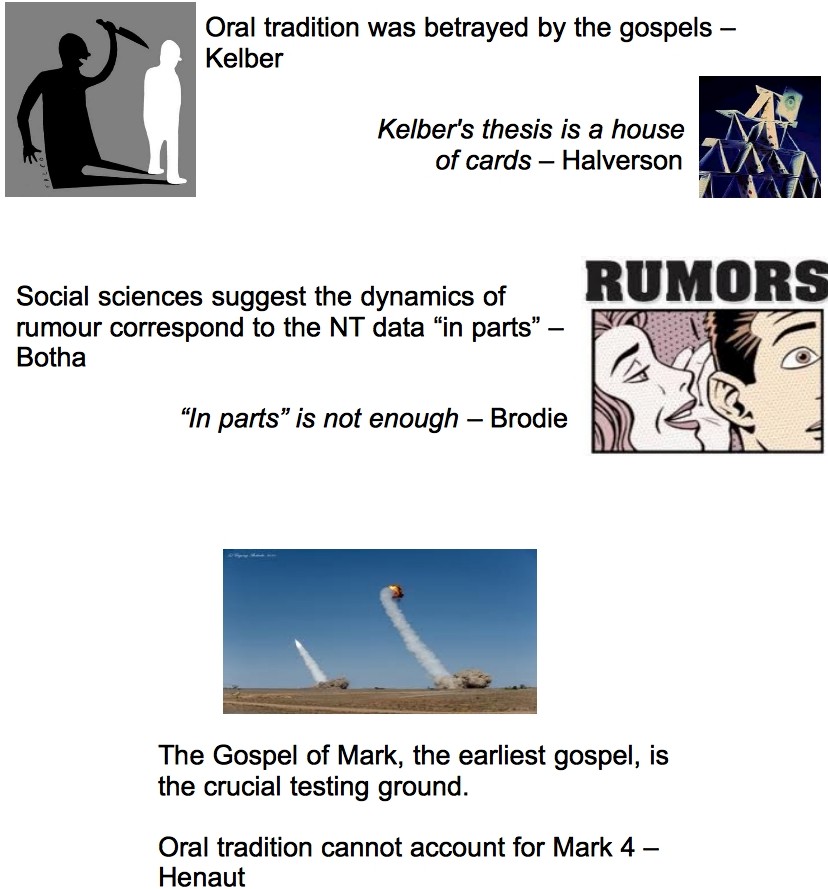 Thomas Brodie has shown that the theory that the Gospel narratives began as oral traditions is not founded on valid logical argument. Nonetheless, he recognizes that an idea that rests on little more than mere presumption “may still be useful as a working hypothesis.” So he proceeds to explore whether the theory of oral tradition works in New Testament studies. What follows is from Brodie’s chapter 6 of The Birthing the New Testament — all posts archived here.
Thomas Brodie has shown that the theory that the Gospel narratives began as oral traditions is not founded on valid logical argument. Nonetheless, he recognizes that an idea that rests on little more than mere presumption “may still be useful as a working hypothesis.” So he proceeds to explore whether the theory of oral tradition works in New Testament studies. What follows is from Brodie’s chapter 6 of The Birthing the New Testament — all posts archived here.
.
First, here’s a chart of the arguments attempting to explain how oral tradition worked — as covered by Brodie. He covers many scholars in quick succession and it can be a bit numbing for someone wanting a quick blog read and who is unfamiliar with the topic to take it all in very easily. I use the many colourful images that have arise in the various attempts to explain how oral tradition is supposed to work:
 Bultmann wrote that oral traditions (the raw materials of the Gospels) spring out (“entspringt“) of “definite conditions and wants of life”. But, Brodie points out for those of us who stop and wonder about such colorfully cloudy statements, Bultmann never explained how this springing process actually works.
Bultmann wrote that oral traditions (the raw materials of the Gospels) spring out (“entspringt“) of “definite conditions and wants of life”. But, Brodie points out for those of us who stop and wonder about such colorfully cloudy statements, Bultmann never explained how this springing process actually works.
It is very easy to use a phrase like “a period of oral transmission” without stopping to envisage what exactly it means. (G. B. Caird, in ExpTim 87)
.
![]() T. A. Friedrichsen, in an unpublished 1992 dissertation, observes that oral tradition, “usually undefined”, is used as a stop-gap in almost any theory that has problems.
T. A. Friedrichsen, in an unpublished 1992 dissertation, observes that oral tradition, “usually undefined”, is used as a stop-gap in almost any theory that has problems.
.
 C. H. Dodd (1963: 6) pinpointed one of the major problem with the theory of oral tradition in New Testament studies: there is simply not enough time. Oral transmissions centuries old cannot be expected to have the same canons or ‘laws’ that would be applicable to narratives less than a generation or “human lifetime” old.
C. H. Dodd (1963: 6) pinpointed one of the major problem with the theory of oral tradition in New Testament studies: there is simply not enough time. Oral transmissions centuries old cannot be expected to have the same canons or ‘laws’ that would be applicable to narratives less than a generation or “human lifetime” old.
Dodd’s therefore chose to modify the theory of oral tradition. Instead of suggesting that communities created the stories in the first place, Dodd suggested that communities modified pre-existing memories and stories. These reminiscences and modifications could involve theological interpretation, too. So by this means Dodd maintained that the oral traditions were a “mixed” link to Jesus himself.
.
 Hengel (1980: 24), on the other hand, proposed a “fixed” link to Jesus. He imagined that Jesus’ brief activity in Galilee left a legacy of “firmly fixed and permanent impressions”.
Hengel (1980: 24), on the other hand, proposed a “fixed” link to Jesus. He imagined that Jesus’ brief activity in Galilee left a legacy of “firmly fixed and permanent impressions”.
Brodie acknowledges that both the mixed and fixed models of oral interpretation, opposite concepts, sound plausible. But they both lack evidence. Indeed, Hengel’s proposal is “a bland assertion” with little argument to support it.
He prejudges a fundamental issue about the nature of the ultimate sources behind the text. (p. 58)
.
 B. Gerhardsson (1961: 214, 315), took a positive step forward by attempting to clarify what was exactly meant by oral tradition and setting out a model to explain how it could work.
B. Gerhardsson (1961: 214, 315), took a positive step forward by attempting to clarify what was exactly meant by oral tradition and setting out a model to explain how it could work.
Gerhardsson’s model borrowed from the larger Jewish tradition of an authoritative teacher instructing his disciples, as is known from the later rabbinic literature and understood from earlier writings. According to this model Jesus was like the typical Jewish teacher instructing his disciples, and would, like them, use “meticulous rabbinical methods of teaching and transmitting, methods with exact processes of memorization and writing.” It is “these processes of memory and manuscript [that] underlie the gospel.”
Brodie rightly comments:
This is an important feature of the gospel presentation, but despite the vividness and centrality of this teacher-disciple picture in Gerhardsson’s presentation of the gospel data, there is still no clear reason for converting it into reliable history. (p. 59)
.
 J. A. Fitzmyer (Theological Studies, 23:442-57) pointed out that for all of Gerhardsson’s good work, that “to a significant degree it does not fit all the data because its rigidity does not allow for the central phenomenon of the differences between the Synoptic Gospels.”
J. A. Fitzmyer (Theological Studies, 23:442-57) pointed out that for all of Gerhardsson’s good work, that “to a significant degree it does not fit all the data because its rigidity does not allow for the central phenomenon of the differences between the Synoptic Gospels.”
But Fitzmyer proposed a solution to this. He added two more stages:
- Jesus’ teaching — the original memorized instruction Jesus passed on to his disciples (Gerhardsson’s model)
- A subsequent oral embellishment and modification as generally happens to stories as they are re-told (Fitzmyer’s first add-on)
- A still later “theological formulation” by the evangelists who composed the gospels (Fitzmyer’s second add-on).
This three-fold model looks impressive, persuasive, familiar, self-evident even.
The three stages, being distinct like this, would appear to be able to account for almost anything and any variation we read about Jesus in the Gospels. If Step 2 does not account for it, then let Step 3 enter, and so forth.
Brodie finds only a few details wrong this this model:
The problem again, as with Gerhardsson’s theory, is that the model does not account for the data. There are more things in the gospels than are allowed for in this three-stage theory.
In the case of Luke, for example, the gospel’s literary quality so pervades the text that it does not fit easily into any of the three stages.
Another is Luke’s detailed reworking of Old Testament stories. For instance, the first conclusion of B. Koet about Luke’s reworking of the scriptures is that it is systematic (Koet 1989: especially 141-143).
There is also a problem with John: despite claims that John depends on several stages, there is evidence that the whole gospel is a thorough literary unity, complex and coherent (see Stibbe 1992, Brodie 1993a).
A solution to the problem is to expand the role of the third stage so that it no longer consists just of adding formulation but comes closer to the idea of thoroughgoing authorship. But the more one does that, the more the earlier stages begin to crumble. (p. 59, my formatting and emphasis)
.
 Then in 1983 Werner Kelber published an entirely different explanation for oral tradition. Clearly the existing models had not been to everyone’s satisfaction. Kelber proposed that the world of oral transmission was totally unlike anything we read in the gospels. “In fact, the gospels betrayed the oral tradition.” (My own recollection of Kelber’s argument was that the Gospel of Mark, for example, was in part an attempt to put an end to the wildness of oral traditions.)
Then in 1983 Werner Kelber published an entirely different explanation for oral tradition. Clearly the existing models had not been to everyone’s satisfaction. Kelber proposed that the world of oral transmission was totally unlike anything we read in the gospels. “In fact, the gospels betrayed the oral tradition.” (My own recollection of Kelber’s argument was that the Gospel of Mark, for example, was in part an attempt to put an end to the wildness of oral traditions.)
But not even Kelber’s thesis has stood the tests of time. J. Halverson (1994: 194) appeared to deliver the coup de grâce with his assessment that Kelber’s “ingenious thesis is ‘a house of cards’.”
.
 P. J. J. Botha (Neotestamentica 27: 209) drew upon social sciences to suggest that “the dynamics of rumor . . . seem to correspond to the New Testament data ‘in parts’.
P. J. J. Botha (Neotestamentica 27: 209) drew upon social sciences to suggest that “the dynamics of rumor . . . seem to correspond to the New Testament data ‘in parts’.
Brodie:
Botha seems to be right, but ‘in parts’ is not enough.
The dynamics among the gospels are so many and complex that parts of those data will correspond to almost any model.
That is why so many diverse models — Bultmann, Dodd, Gerhardsson, Fitzmyer, Botha — can appear credible. The theories really do correspond to data. But not to all the data. (pp. 59-60, my formatting and emphasis)
.
The problem of Mark 4
B. W. Henaut (1993: 305) has studied the Gospel of Mark’s parable chapter and concluded that
It is far more difficult to prove . . . that oral tradition lies behind this particular text than has been commonly acknowledged.
Take a look at the chapter headings of Henaut’s book and we can see a layout of a similar discussion on the problem of orality given the sophisticated textuality of the gospels as Brodie has covered here. Henaut focuses on Mark 4 as a case-study.
This works looks like it addresses the sort of detail I often like to cover in a blog post to demonstrate an argument. I have found a cheap copy online (a saving of over $130!) so maybe I will be able to post on sections of it here in the future.
Brodie concludes this section discussing the unworkable nature of oral tradition:
The difficulty surrounding Mark 4 reflects a larger problem. Mark, generally regarded as the first gospel, is the crucial testing ground for tracing tradition (including oral tradition), but the tracing process does not work. Major efforts to distinguish tradition from redaction have been at such odds with one another as to suggest that, on the tradition question at least, Markan research sometimes seemed to be in a cul-de-sac (U. Luz . . .).
The conclusion seems unavoidable: in practice, thus far at least, the hypothesis of oral tradition has proved unworkable. (p. 60, my bolding)
Next in this series will look at Brodie’s case for why oral tradition is unnecessary.
If you enjoyed this post, please consider donating to Vridar. Thanks!



I’ve lived and worked all my life, like millions of others, in part in the field of oral culture; in media and media production and studies in part, in radio, music, popular culture studies, and in college lecturing. And from a perspective of a lifetime of involvement in this medium, I feel that the total rejection of oral culture study or its relevance to biblical study, is not right. Rather than totally rejecting this entire field of study, what we need to do is to simply refine our studies, after all. Indeed, the millions of persons who are active in the field of Media and Media Studies, Anthropology, Folklore, might well be offended by Brodie’s apparent desire to simply eliminate their life’s work, as irrelevant to anything in the Bible, say.
No doubt to be sure, the common apologetic use of “verbal culture” by conservatives like Dodd, to simply assert a reliable link from the gospels to first person experiences of Jesus himself, speaking, was naive. The fact is – as those of us who have worked with it all our lives well know – that verbal/aural culture is often extremely unreliable; it full of often, note, UNRELIABLE rumors. So that even verbal rumors of a “Jesus” would not prove of course, that a real Jesus existed. Any more than today’s urban legends prove anything either.
No doubt, conservatives have been naive about oral/verbal/aural communications, and have misused it. Still, to claim or seem to imply that the whole field of study of verbal, spoken, aural culture is therefore irrelevant, stikes me as more than little incendiary and underinformed.
Perhaps Mr. Brodie would like to visit a modern college Communcations , Media, or Interpersonal Communications department? And speak with a few dozen faculty members? Brodie’s rejection of an entire established field of academic study, is a best amusing; but more often deeply offensive.
This is completely absurd! What on earth would a visit to a Media and Communications college have to do with whether or not the evidence pointed to the Gospel narratives being literary creations? Do you really think Brodie does not somehow “believe in” or “acknowledge the value” of communication and media studies just because he thinks the Gospel narratives were literary and not oral creations from source?
We want to know where the evidence leads. If the evidence strongly pointed to the Gospels being stitched together from oral traditions should the creative literature faculties get all upset and offended because their discipline was being diminished by biblical scholarship?
Some people can never accept a new paradigm simply because they cannot accept anything that goes against what they have always believed.
Have you ever seriously investigated any point of view — e.g. the literary paradigm of Brodie and others — other than your own perspective before? Or are you like the historicists who know only how to knee-jerk whenever they encounter anything outside their comfort zone?
I feel that it is more likely that Brodie – like many other print-oriented (“publish or perish”) scholars, is the one who is unable to fully face this (relatively) newly-developed field. Many print-oriented scholars, when they first see verbal culture, are simply dismayed and unable to make out the nuances of it. And that is why they either 1) misuse it, like Dodd; or 2) in exaggerated defensiveness, they totally reject its relevance.
But there is no need for Mythicists to reject the relevance of Interpersonal communication, of oral culture. The fact is that those of us who have experience in folkloristics, verbal culture study, and who know something about the New Testament as well, can easily imagine any number of likely – and document-able, biblically and historically-supportable – scenarios, in which oral culture almost certainly played a part in the formation of that written document; but at the same time, without confirming its authenticity. Since after all, oral culture normally contains many false rumors and myths.
Since Gunkel’s work on the subject, more than a century ago, many refinements in the study of Oral Culture have been made.
1) Note for example that even if we take the New Testament at face value, still some Oral Culture seems involved, according to the Bible itself. Indeed the Bible itself seemed in some readings, to refer to in effect, the oral accounts of earlier “eyewitnesses” (John; Luke?). Yet note also that those references to “eyewitness” at times, do not validate those sources as strongly as many might think; the gospels suggest they were “witness” not to Jesus himself in person, but to the “word,” and its “power.” Which might well be witness merely to the power of false belief, say. Or witness to texts; “word”s. Or witness to Philo’s “logos,” or “word.” Confirming Dogherty’s neo-Platonist thesis.
2) Furthermore? If it seems – in some accounts – that for 20 years or so, 33-55 AD, reports of Jesus were carried around mostly in the fallible memories of “witnesses,” then this presents a problem for Historicism. Twenty years in memory/oral reports environment, many historians note, is a fatal length of time for their accuracy. Many historians, suggest that an interval of 20 years or more, is fatal for the accuracy of most would-be historical accounts. (Cf. Wiki article on historiography?).
3) Especially we should note this: often the body of oral/spoken culture might in some venues reflect courtly story-telling traditions; but often was indeed more oriented to everyday illiterate people and their stories; as we know from Folkloristics and especially Anthropology. Remember that in ancient times, typically only 2% of the population could read or write. Suggesting that 98% were illiterate, uneducated – and largely unreliable as witnesses therefore.
Many “oral reports” were therefore from inexpert – and literally illiterate – people. So that the early oral reports are often simply, uneducated and inaccurate.
4) While in fact, many biblical scholars suggested in effect, more specifically, that oral culture tends to contain many ANE myths and 5) false rumors.
So finally? If the Bible relies on oral reports of alleged “eyewitnesses,” as narrated by oral reports? Then the Historicist case is not thereby proven. Quite the opposite: its veracity is therefore more severely impugned, rather than verified.
For these and many other reason, Mythicists therefore have nothing to fear. And everything to gain. From a long hard look at the possible effects of oral culture on the gospels; since oral culture is always full of false rumors, and myths.
Brodie seems right in noting problems, to be sure, in conservative historicist accounts of oral culture and the Bible. But the answer is not to throw out this entire academic field of study as irrelevant. But to simply note problems with earlier investigations. And then begin to improve on them.
There is nothing in verbal culture study that “proves” that Jesus was real. Or even that strongly suggests it. Quite the contrary; likely early Christianity was at least partially based on mere oral rumors; a source that is even less reliable, even more full of myths, than many ancient written documents.
Your opening ad hominem does nothing to support your argument or address that of Brodie.
Just repeating what you believe is the importance and relevance of your favourite subject does nothing to address the reasons Brodie and others have come to question the oral tradition model for the Gospels.
Just expanding upon the points you have already made is not a valid response to my criticisms of those points but indicates a mindset that is deaf to criticism and to any view contrary to its own.
Persistent failure to write according to the norms of fundamental punctuation indicates comments are coming from someone who lacks competence in the standards of formal education despite his claims to the contrary, and this impression is not weakened by the anonymity of the author.
If you wish any further comments on this matter to be posted here then make sure they conform to the comments-guidelines and that they actually address the arguments being made here (that is, that they are not just repeats of your own contrary view.)
You also seem to be justifying your position in part on grounds that it does not support the historicity of Jesus. That is not a valid rationale. It suggests an ideological agenda is governing your evaluation of methods and models. The question being addressed is the nature of the Gospels and the most plausible explanation for what we are coming to learn about the nature of the Gospels.
‘ Since after all, oral culture normally contains many false rumors and myths.’
By a remarkable coincidence , these false rumours and myths that the Gospels were based on just happened to have strong parallels with the Elijah/Elisha cycle.
Just before the calming of a storm in Jonah, Jonah is found sleeping and has to be awoken and his help sought.
Just before the calming of a storm in Jonah, Jesus is found sleeping and has to be awoken and his help sought.
What can explain this parallel except that false rumours were spread about that Jonah was sleeping before a miracle was performed? Perhaps Jonah himself spread these myths and rumours about him? (After all, no ancient author ever wrote a story. He simply wrote down the word on the street.)
Addressing one by one, Brodie’s points?
Objection 1: that the existence of oral rhythms in written speech does not mean oral cultural influences: since you can write on a computer, copying oral rhythms.
My objection: yes; but if you do, then … your writing IS being influenced by oral culture.
Didn’t you read the first post in this series? Brodie in fact says exactly what you say here. Of course this is being influenced by oral culture. But if you read the first post that introduced this series you would see that you are simply repeating what Brodie himself says as to oral influence on forms of communication and that you are missing the point he is making about content.
Brettongarcia, I am keeping your comments in the spam bin until I see evidence that you have read and understood Brodie’s argument — at the very least as I have presented it in this series of posts. (Your latest comment did not pass the test and has been deleted. You did not even address the point I made above.) I also refer you to my comment above at http://vridar.wordpress.com/2012/10/25/oral-tradition-in-nt-studies-is-unworkable/#comment-37320 and direct your attention in particular to the very fundamentals of punctuation — indicative of a more serious deficiency in your education. If you wish to be taken seriously then
(1) demonstrate that you have registered the detail of the arguments you are responding to;
(2) address those points in your comment;
(3) conform to the fundamentals of written English expression in order to give readers some confidence they are reading someone who has a minimal competence in the norms of written expression.
Till then, your comments will not be retrieved from the spam bin.